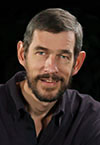Throughout history humanity has exhibited a gravitational pull toward self-worship.
It can take the individualistic form of the modern and postmodern eras in which people devote narcissistic attention to themselves—whether appearance, achievement, or accumulation of wealth. A corollary of this is the near-worship attention given to celebrities or anyone able to seize a moment of fame. People seem hard-wired to do this sort of thing. Just look at the tabloids at the grocery store checkouts.
This particularly happens when people gain wealth. Which is why we see so much self worship today, whether overt or subtle. Abundance of anything apart from God tends to cloud our vision of God. This happens because these abundances seduce us. They commandeer our attention, convince us that we are of central importance, and result in false pride.
Wealth is not inherently bad. Sometimes it comes from the blessings of God. But when we pursue it in the absence of God, we easily go blind.
Before pointing fingers, anyone ought to do some self-examination, because the self-worshipping tendency is universal. People commonly maintain exalted opinions of themselves or the group with whom they identify without thinking about it.
Creating False Realities
Along with, and resulting from, this tendency is the inclination to construct false realities. As human beings, if we resist bowing to an authority higher than ourselves—particularly God—we essentially become our own gods. This can happen anywhere from science to political regimes, academia to narco gangs. Refusing any reality beyond our own, we define our own earthly realities and assume that’s all there is. We don’t overtly worship ourselves, but reserve for ourselves the seat of authority in how we think and conduct life—the seat that would otherwise be God’s. We create our own social rules and priorities—and our rules change as cultural changes, or as we change culture. We also assume that if we’re somehow “good,” we’ll go to “a better place” when we die.

The problem with creating our own realities is that it’s not honest—neither with our own human condition, nor with objective truth claims. Most people don’t outright reject truth claims (like those of the Bible or any other sacred religious text) as much as they simply ignore them. And if life is good—or just tolerable—most folks will assume that their assumptions are correct or adequate.
But what happens when disaster strikes? What happens when, in this life or at death, people confront a God and a reality that are both greater than and contradictory to their own?
How can we imagine that the material, social, political, and economic realities our society has created, and even the physical stuff of the world we live in, are all there is—that there’s not something more, far greater and eternal, behind them?
If you’re reading this, hopefully you’re awake. Wake up whomever you can while they still have time.
—-
Top photo credit: www.CourtneyCarmody.com








